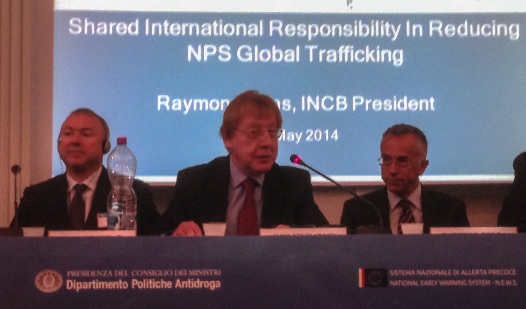INCB President underscores the importance of shared responsibility in reducing global trafficking of new psychoactive substance
Raymond Yans, President of the Board, addressed the 2014 International Conference on New Drugs, delivering a speech on shared international responsibility in reducing global trafficking of non-controlled new psychoactive substances (NPS). The abuse of NPS are emerging at an unprecedented rate, posing one of the greatest substance abuse challenges to policy makers, health care professionals and communities at large in recent memory. Mr Yans noted that while not all of the nearly 350 NPS identified by UNODC will eventually establish themselves in consumer markets, each represents an unknown, and thus unacceptable, level of risk.
The Board's initiative on international operations on NPS (known as Project ION), which operates under the direction of the Task Force on new psychoactive substances, aims to support law enforcement and regulatory agencies' efforts to prevent NPS from reaching consumer markets. Based on INCB's practical experience gained in countering the trafficking of non-controlled precursor chemicals and the principle of international shared responsibility, Project ION coordinates the exchange of information and intelligence on suspicious shipments of, or trafficking in, NPS, with Government focal points so as to identify questionable large-scale manufacturers, exporters, importers and distributors of these substances.
A number of NPS are to undergo critical review in June by the World Health Organization for possible scheduling under the international drug control conventions. However, until such time as NPS come under international control, Mr Yans urged Member States to nominate NPS focal point(s) to receive alerts and participate in operational activities under Project ION.
Hundreds of participants are attending the two day conference on NPS, being held in Rome from 14 to 15 May, and which is being hosted by the Italian Government in partnership with the European Monitoring Centre for Drugs and Drug Addiction (EMCDDA), the United Nations Inter-regional Crime and Justice Research Institute (UNICRI), and the United Nations Office on Drugs and Crime (UNODC).
